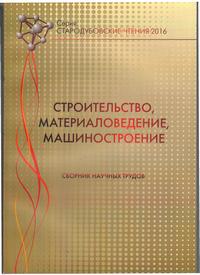Methodology of orphanages for social adaptation of children of preschool and school age
Keywords:
orphanage, children - orphans, education, architecture, pedagogy.Abstract
Annotation. Goal. o create new methods of orphanages for children of preschool and school-age children, where children will become more adapted for life. Methods. Using a systematic approach to the matter, which consists of the research and analysis of the economic and political situation in Ukraine, the existing regulatory framework and research in psychology and pedagogy, state space planning and design features of orphanages in Ukraine and abroad. Results. We propose a technique of designing orphanages, which is based on: the number of orphans, establishing planning property residential institutions for various forms of education of children, taking into account foreign and domestic experience. Define the composition and mutual arrangement of the premises in accordance with the methods of education and typological properties of boarding schools for orphans. Scientific novelty. Any form of maintenance and upbringing of orphans, there must be mechanisms to evaluate the efficiency of use of available resources in the state. The proposed directions of development of public policies that establish a system for evaluating the effectiveness of the organization and content of education for orphans, for the organization of social services, as well as for project-oriented organizations. Practical significance. The proposed technique can work to put the organization of education of orphans to a higher level, subordinate to all existing Ukrainian resources to achieve the main goal, to make the process of innovation, and to attract investment.
References
Akchurina-Muftieva N.M. Formirovanie tipov zdanij domov rebenka i detskih domov/ Avtoref. ... kand. arh. - M., CNIIEHP uchebnyh zdanij, 1986, s. 21.
Akimova M.N. i dr.] Organizaciya raboty s priemnymi sem'yami. Samara: Samven, 1998. - S. 49.
Analiticheskij material po vyyavleniyu i ustrojstvu detej, ostavshihsya bez popecheniya roditelej // Vestnik obrazovaniya. -g2— 3. № 16. - S. 3-9.
Gigienicheskie trebovaniya k ustrojstvu, soderzhaniyu, organizacii rezhima raboty v detskih domah i shkolah-internatah dlya detej-sirot i detej, ostavshihsya bez popecheniya roditelej/ Moskva 2001
Gorshkova E.A. Rabota vospitatel'nyh domov v Germanii// Detskij dom. 2005. No1/14. S. 34. URL: www.journaldetskidom.ru/magazine/?act=more&id=284
Zakon Ukrainy ob ohrane detstva/ S izmeneniyami ot 28.12.2014
Rekomendacii po proektirovaniyu detskih domov i domov rebenka/ - M., CNIIEHP uchebnyh zdanij, 1988, 73 s.
Rekomendacii po proektirovaniyu detskih domov semejnogo tipa./ kand.arh. E.YU. Peresvetovym, arh. N.M. Serednyak , kand. tekhn. nauk M.S. Lyubimovoj i kand. ehkon. nauk N.N. Lazarevoj/ CNIIEHP zhilishcha, – Moskva, 1991-18s.
MGSN 4.15-98 TSN 31-314-98 Obrazovatel'nye uchrezhdeniya dlya detej-sirot i detej, ostavshihsya bez popecheniya roditelej/ Pravitel'stvo Moskvy. – Moskva, 1998. – 54s. Rezhim dostupu: http://standartgost.ru/g/%D0%A2%D0%A1%D0%9D_31-314-98
Elektronnij resurs rezhim dostupu: http://site.iugaza.edu.ps/oasfour/courses/mycourse754/
Elektronnij resurs rezhim dostupu: http://dp.vgorode.ua/reference/detskye_doma/
Elektronnij resurs rezhim dostupu: http://indigo-center.dp.ua/
Elektronnij resurs rezhim dostupu: http://strategiiuspeha.ru/Famile.html
Elektronnij resurs rezhim dostupu: http://shilova.org/content/view/53
Статья рекомендована к публикации: д-ром. техн. наук, проф. Л.С. Савиным (Украина) и д-ром. техн. наук, проф. О.В.Сергейчуком (Украина)
Downloads
Published
Issue
Section
License
Редакція Видання категорично засуджує прояви плагіату в статтях та вживає всіх можливих заходів для його недопущення. Плагіат розглядається як форма порушення авторських прав і наукової етики.
При виявлені у статті більш ніж 25% запозиченого тексту без відповідних посилань та використання лапок, стаття кваліфікується як така, що містить плагіат. У цьому випадку стаття більше не розглядається редакцією, а автор отримує перше попередження.
Автори, в статтях яких повторно виявлено плагіат, не зможуть публікуватися в усіх журналах Видавництва ДВНЗ «Придніпровська державна академія будівництва та архітектури».
Автори, які публікуються у цьому журналі, погоджуються з наступними умовами:
- Автори залишають за собою право на авторство своєї роботи та передають журналу право першої публікації цієї роботи на умовах ліцензії Creative Commons Attribution License, котра дозволяє іншим особам вільно розповсюджувати опубліковану роботу з обов'язковим посиланням на авторів оригінальної роботи та першу публікацію роботи у цьому журналі.
- Автори мають право укладати самостійні додаткові угоди щодо неексклюзивного розповсюдження роботи у тому вигляді, в якому вона була опублікована цим журналом (наприклад, розміщувати роботу в електронному сховищі установи або публікувати у складі монографії), за умови збереження посилання на першу публікацію роботи у цьому журналі.
- Політика журналу дозволяє і заохочує розміщення авторами в мережі Інтернет (наприклад, у сховищах установ або на особистих веб-сайтах) рукопису роботи, як до подання цього рукопису до редакції, так і під час його редакційного опрацювання, оскільки це сприяє виникненню продуктивної наукової дискусії та позитивно позначається на оперативності та динаміці цитування опублікованої роботи (див. The Effect of Open Access).

